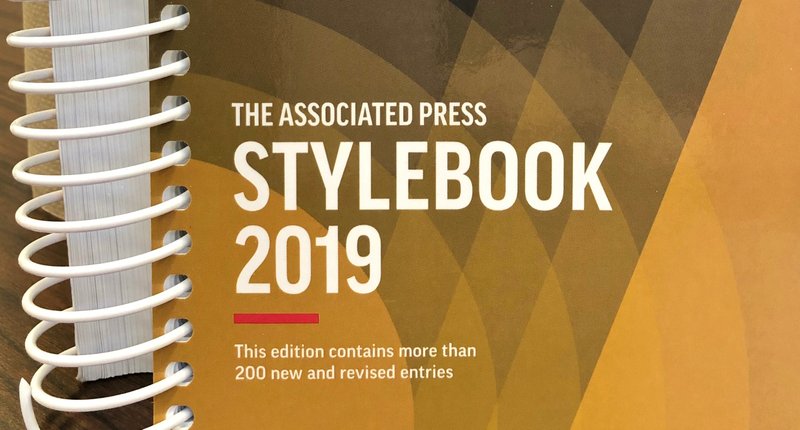This week, I'll continue to answer questions from readers.
POSSESSIVES
Many asked about ways to use that apostrophe that signals ownership of something. My guidelines are from The Associated Press Stylebook.
Most possessives are straightforward. For a word that's in single form, you just add an apostrophe followed by an "s."
the angel's halo
the biographer's expertise
Tesla's lightbulb
When the word is a plural form but doesn't end in an "s," you do the same thing.
the children's Xbox
the horsemen's path
the media's coverage
Even when a word is in single form and ends in an "s," you also do the same thing. The Associated Press recently changed its rule on this, no doubt throwing many people into turmoil.
the wineglass's design
the illness's origin
the walrus's tusks
To confuse us, words in plural form that end in "s" get a different treatment. With these you add only an apostrophe.
the neighbors' yard
the boxes' contents
the speakers' lessons
And then sometimes you need to show possession for a proper noun. You use an apostrophe and no "s."
Arkansas' history
Chris' monologue
Agnes' recipe file
And the rules throw one crazy thing at us. I always have to look this one up to make sure I'm not imagining things.
When a word ends in either an "s" or the sounds of an "s" and the following word starts with an "s," you use the apostrophe at the end of the word but not the "s."
For goodness' sake
For science's advances
For appearance' sake
ONE AS A NOUN, TWO AS A VERB
English has a slew of words that are a single word as nouns but split into two words to be verbs.
A reader asked about "breakdown" and "break down." A breakdown can be failure, a decomposition of a substance, a mental collapse. As a verb, it would be, "I just know the car
will break down during my road test."
Some other examples of this:
Checkup and check up:
I have to go to the doctor for a checkup. I need to check up on the exact date.
Dropout and drop out:
I was a dropout at 16. I have no idea what made me drop out.
BRING AND TAKE
I will be honest. I don't always use these correctly.
You're sitting on the couch, and you've left the remote control on the dining room table, which is way too far away. This is when having an energetic child in the house is so convenient. "Son, could you bring me the remote control?" You ask him to take it from elsewhere and bring it to you.
Suppose you're going to a party, and you have confirmed that you make the best artichoke dip ever. You decide to take some of your dip to the party. You call the host of the party. He answers the phone, hears your news, and he excitedly tells his significant other, "Stacy is bringing her artichoke dip to the party!"
See the difference?
I'M JUST SAYING
A reader asked me to find the origin of this phrase.
"I'm just saying" seems to be more recent equivalent of "No offense, but ..."
You've said something that you know will upset or irritate the listener. "This cake is pretty dry. Just saying."
NPR reporter Scott Simon did a broadcast on this a few years back. He had heard that the phrase had either originated from comedian Eddie Murphy or the Seinfeld show, but he couldn't find proof either way. Simon decided that the phrase should be banished and that people should simply opt for a little more kindness when they speak to people. I have to agree with him.
LITERALLY
Wow, this word is overused. When you say literally, you should be saying that something truly, really has happened.
I literally deleted every email from my former boyfriend.
But it so often is used when it's not true.
I literally died when I got another email from him.
I doubt you did. How could you be writing that after death?
The substitute teacher's lesson literally sucked the life out of me.
Really? Was the substitute a vampire?
My tweet was literally read by everyone on Earth.
Come now.
Much of the time, the speaker/writer means "figuratively" when they use "literally." Figuratively means you're exaggerating a bit on what you're saying, but you're saying it for effect.
"Literally" is used incorrectly so often by so many people that the dictionary has added "virtually" and "in effect" to define the word literally. So this means literally means figuratively.
GRADUATED FROM COLLEGE
When I was writing my grammar column in Virginia, this was the No. 1 thing people asked me about. Do you graduate college? Or do you graduate from college?
You graduate from college.
TRY TO DO THIS
You don't try and do something. You try to do something.
People will never succeed at accomplishing everything they set out to do. So, it's wrong to tell someone to try and achieve a thing. You can't be sure they will.
Sources include The Associated Press Stylebook, Common Errors in English Usage, Quick and Dirty Tips, Merriam-Webster, Daily Writing Tips, NPR. Reach Bernadette at
Style on 11/11/2019

